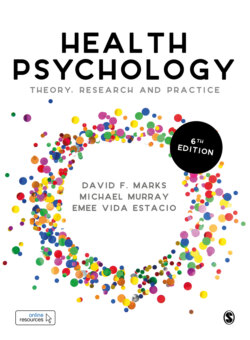Читать книгу Health Psychology - Michael Murray - Страница 94
На сайте Литреса книга снята с продажи.
Popular Views of Health
ОглавлениеEvidence from a series of studies of popular beliefs about health and illness in Western society illustrates the interaction of what can be described as the ‘classic’, the ‘religious’, the ‘biomedical’ and the ‘lifestyle’ approaches to health and illness. Probably the most influential study of Western lay health beliefs was carried out by Herzlich (1973, 2017). She conducted interviews with a sample of French adults and concluded that health was conceived as an attribute of the individual – a state of harmony or balance. Illness was attributed to outside forces in our society or way of life. Lay people also referred to illness in terms of both organic and psychosocial factors. On their own, organic changes did not constitute illness. Rather, for the layperson, ‘physical facts, symptoms and dysfunctions have, of course, an existence of their own, but they only combine to form an illness in so far as they transform a patient’s life’. The ability to participate in everyday life constitutes health, whereas inactivity is considered the true criterion of illness. Herzlich’s study was seminal because it provoked further research into popular health beliefs.
Blaxter (1990) analysed the definitions of health provided by over 9,000 British adults in a health and lifestyle survey. She classified the responses into nine categories:
1 Health as not-ill (the absence of physical symptoms).
2 Health despite disease.
3 Health as reserve (the presence of personal resources).
4 Health as behaviour (the extent of healthy behaviour).
5 Health as physical fitness.
6 Health as vitality.
7 Health as psychosocial well-being.
8 Health as social relationships.
9 Health as function.
In analysing the responses across social classes, Blaxter (1990) noted considerable agreement in the emphasis on behavioural factors as a cause of illness. She commented on the limited reference to structural or environmental factors, especially among those from working-class backgrounds.
However, health beliefs go beyond descriptive dimensions to consider underlying aetiology. In a discussion of social representation theory, Moscovici (1984) suggested that people rarely confine their definition of concepts to the descriptive level. Rather, lay descriptions often include reference to explanations. Lay perceptions of health and illness can be rooted in the social experience of people, in particular sub-cultures. A study of East and West German workers found similar findings to those of Herzlich, but with an added emphasis on health as lifestyle (Flick, 1998). Similarly, in a study of Canadian baby-boomers, Murray et al. (2003) found a very activity-oriented conception of health. In another study, Campbell (2015) explored the meaning of health among older adults in the United Arab Emirates. The narratives suggest that health was embedded in culture and represented as something that is valuable and coming from God. Health was also attributed to the food they eat and was generally perceived to be better in the past.
